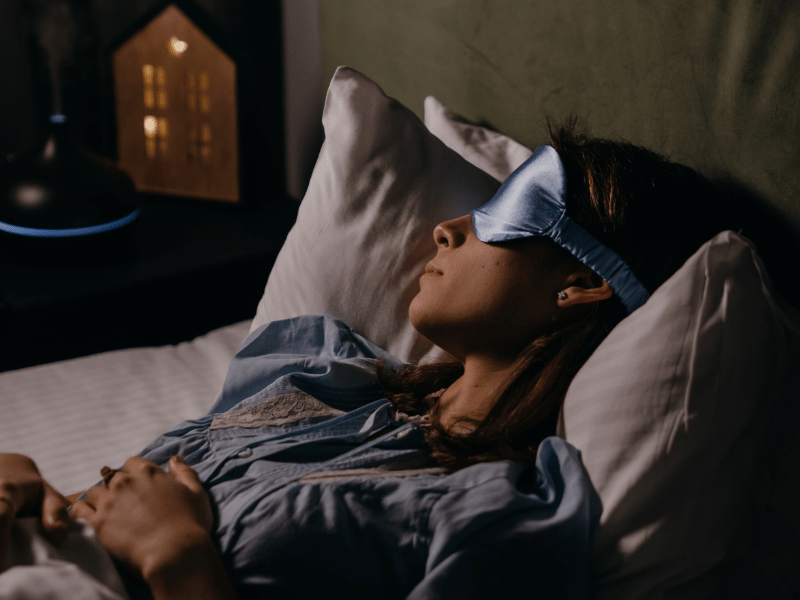Introduction
Are you tossing and turning at night due to a persistent cough? A nightly cough can be more than an inconvenience—it can significantly disrupt your sleep and overall well-being. Our article aims to provide practical, effective strategies to alleviate your nighttime coughing so you can rest easier.
Read on for relief that ends those endless nights of hacking and leaves you looking forward to bedtime again.
Tips to Stop Coughing at Night
To stop coughing at night, avoid irritants and allergens in your bedroom environment. Use a humidifier or vaporizer to add moisture to the air, which can help soothe your throat and reduce coughing. Consider trying over-the-counter medications or natural remedies specifically formulated for nighttime cough relief.
Avoid irritants and allergens
Keeping the environment free from irritants and allergens can significantly reduce nighttime coughing. These culprits, often in the form of dust mites, pet dander or pollen, trigger allergic reactions that lead to persistent coughing.
Employ measures like sleeping on hypoallergenic pillows, regularly washing your bedding in hot water and keeping pets out of the bedroom to control exposure. A high-efficiency particulate air (HEPA) filter can also be an effective tool for eliminating airborne allergens within indoor spaces.
This proactive approach not only helps prevent those disruptive spells of nighttime cough but also contributes towards overall health improvement.
Use a humidifier or vaporizer
To alleviate coughing at night, utilizing a humidifier or vaporizer can be highly beneficial. Here's why:
- Increasing humidity levels in your bedroom can help soothe an irritated throat and reduce the intensity of coughing episodes.
- Dry air can exacerbate coughing fits, making it harder to get a good night's sleep. By adding moisture to the air with a humidifier or vaporizer, you can create a more comfortable environment for sleeping.
- Humidifiers and vaporizers work by releasing water into the air, which helps to moisturize your nasal passages and respiratory system. This can effectively relieve dryness and irritation that contribute to nighttime coughing.
- Adding essential oils like eucalyptus or peppermint to your humidifier can provide additional benefits. These oils have natural decongestant properties that can promote easier breathing and relieve congestion, ultimately reducing coughing.
Try over-the-counter medications or natural remedies
To help alleviate nighttime coughing, there are several over-the-counter medications and natural remedies that you can try. These options can provide relief and promote a restful night's sleep. Here are some suggestions to consider:
- Cough syrups: Over-the-counter cough syrups containing ingredients like dextromethorphan or guaifenesin can help suppress coughing and loosen mucus in the airways.
- Expectorants: Taking an expectorant medication can help thin and loosen mucus, making it easier to cough up and clear your airways.
- Honey: Consuming a teaspoon of honey before bed can soothe the throat and reduce coughing. Make sure to use raw or organic honey for its potential antioxidant properties.
- Herbal teas: Drinking herbal teas with ingredients like chamomile, ginger, or peppermint can provide respiratory relief and ease nighttime coughing.
- Warm salt water gargles: Gargling with warm salt water before bed can reduce inflammation in the throat and minimize irritating coughs.
- Steam inhalation: Inhaling steam from hot water or using a humidifier can help moisten dry airways, reducing coughing during sleep.
- Essential oils: Adding a few drops of essential oils like eucalyptus or lavender to a diffuser near your bed can promote relaxation and relieve nighttime cough symptoms.
When to See a Doctor for Nighttime Coughing
If your nighttime coughing persists for more than a few weeks or becomes severe and starts to disrupt your sleep, it may be time to seek medical attention. It's especially important to see a doctor if you experience other symptoms along with the cough, such as fever, chest pain, difficulty breathing, or blood in phlegm. These could be signs of an underlying condition that needs further evaluation and treatment.
Additionally, if you have a history of respiratory problems like asthma or chronic obstructive pulmonary disease (COPD), it's crucial to consult with your healthcare provider about your nighttime cough. They can assess your symptoms and determine if any adjustments need to be made to your current treatment plan.
Remember that a persistent nighttime cough can also indicate other serious conditions such as bronchitis, pneumonia, or even lung cancer. Seeking medical advice will help rule out any potentially harmful causes and ensure appropriate management is provided.
Don't ignore ongoing or worsening nighttime coughing – reach out to a healthcare professional who can provide proper diagnosis and guidance for effective relief and better sleep quality.
Conclusion
In conclusion, by following these tips and remedies, you can effectively stop coughing at night and experience a peaceful sleep. Avoiding irritants and allergens, using a humidifier or vaporizer, and considering over-the-counter medications or natural remedies are all valuable strategies to alleviate nighttime coughing.
However, if your cough persists or worsens, it is important to seek medical advice for proper evaluation and treatment. Take control of your nighttime coughing and improve the quality of your sleep tonight.
FAQs
1. What are some natural remedies to stop coughing at night?
Some natural remedies to stop coughing at night include drinking warm water with honey, using a humidifier in your bedroom, gargling with saltwater, and propping yourself up with pillows while sleeping.
2. Are over-the-counter cough medicines effective for stopping nighttime coughing?
Over-the-counter cough medicines can be effective for stopping nighttime coughing, but it is important to choose the right one based on your symptoms. Consult a doctor or pharmacist if you have any concerns or underlying health conditions.
3. When should I see a doctor for my nighttime cough?
You should see a doctor for your nighttime cough if it persists for more than two weeks, is accompanied by other severe symptoms such as chest pain or difficulty breathing, or if you have pre-existing health conditions that may require medical attention.
4. How can I prevent nighttime coughing in the first place?
To prevent nighttime coughing, avoid exposure to irritants such as smoke and allergens, practice good hygiene by washing hands frequently, maintain good indoor air quality by keeping your living space clean and well-ventilated, and stay hydrated by drinking plenty of fluids throughout the day.
Experience comfort you control with an iSense adjustable-firmness mattress. Every iSense mattress features 20 comfort settings you can use to adjust your level of comfort every night. If you are interested in the purpose of a headboard, we have an article about that exact topic. Your support needs change as your health changes, so your mattress should, too. From soft to firm, enjoy consistent pressure relief at every setting—only with iSense.






















